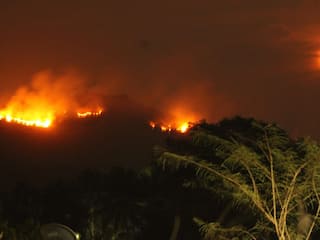Delhi Pollution: 38 Stations Report ‘Severe’ AQI Over 400, Fines Of Rs 5.85 Cr Imposed On Day 1 Of GRAP-3 Curbs
To curb pollution, authorities deployed traffic police, transport department teams, and other officials to enforce GRAP stage III restrictions.

Delhi's air quality deteriorated further on Saturday, with most areas falling into the "severe" category, enforcing the authorities to ramp up enforcement under the third stage of the Graded Response Action Plan (GRAP). On the first day of intensified anti-pollution measures, penalties totalling approximately Rs 5.85 crore were imposed.
The 24-hour Air Quality Index (AQI) of the city, recorded at 4 pm, rose to 417, the highest in the country. This marked a significant increase from Friday’s AQI of 396, according to the Central Pollution Control Board (CPCB).
According to a report by news agency PTI, the CPCB noted that air in the "severe" category, the air poses health risks to everyone and has severe impacts on those with pre-existing conditions. Among Delhi's 39 monitoring stations, only Sri Aurobindo Marg recorded air quality outside the "severe" range, while the rest reported AQI levels exceeding 400.
As the restrictions under the third stage of GRAP came into force on Friday, authorities intensified action against those violating norms with teams of traffic police, transport department and others penalising violators.
Delhi Traffic Police issued nearly 550 challans for violations of the ban on BS III petrol and BS IV diesel vehicles on Friday, resulting in fines exceeding Rs 1 crore on the first day of restrictions under GRAP Stage III.
Violators face a penalty of Rs 20,000, while interstate buses using diesel, except for BS VI-compliant ones, are also prohibited from entering Delhi.
Additionally, police targeted vehicles lacking Pollution Under Control Certificates (PUCC), issuing fines to 4,855 vehicles, amounting to Rs 4.85 crore. Motorists without a valid pollution under control (PUC) certificate face a Rs 10,000 fine, with challans processed through courts.
Delhi Environment Minister Gopal Rai Accused BJP-Ruled States Of Sending BS IV Diesel Buses To Delhi
During an inspection at the Kashmiri Gate interstate bus terminal on Saturday, Delhi Environment Minister Gopal Rai accused BJP-ruled neighbouring states, including Haryana, Uttar Pradesh, and Rajasthan, of sending BS IV diesel buses to Delhi in violation of the guidelines.
"The BJP governments are deliberately sending diesel buses to Delhi, which is prohibited under the current guidelines, to worsen air pollution," said Rai pointing to states like Haryana, Uttar Pradesh, and Rajasthan.
In order to ensure strict adherence to the ban, Rai announced that a total of 84 enforcement teams from the Transport Department and 280 teams from the Traffic Police have been mobilised.
Other measures include a ban on construction and demolition activities, suspension of mining-related tasks, and regular water sprinkling on major roads. Schools for classes up to 5 will shift to online learning starting Monday.
Old age homes in the city are also heading for the precautions to safeguard residents. Measures include restricting outdoor activities during peak pollution hours, mandatory mask usage, and keeping oxygen cylinders on standby.
Chairman of Aashirwad Old Age Home, General Bhupendra Singh, said, "We do not allow anyone to step outside the premises due to the toxic air quality. The elderly, being the worst affected group, are strictly prohibited from venturing out during peak pollution hours, especially in the morning and evening."
"If they must go out for medical appointments, they are instructed to minimise outdoor time and wear masks for protection," he added.
One of the caregiver at the Sai Sahara old age home, Rajeshwari, highlighted the additional precautions being taken. "We are focusing on maintaining a healthy diet for the residents and have restricted outdoor activities, including morning walks, due to the severe air quality," she said.






































